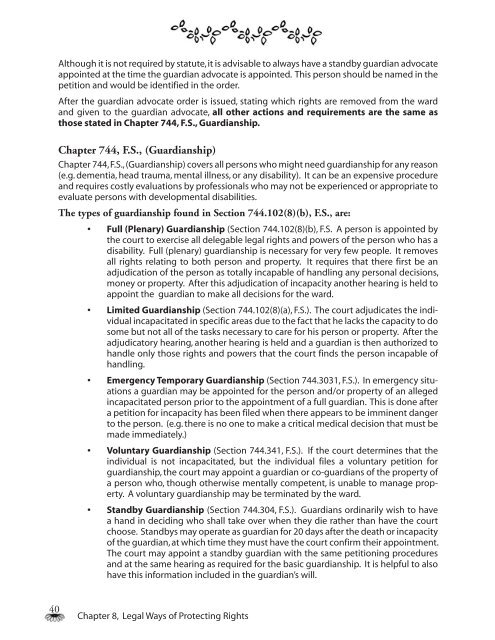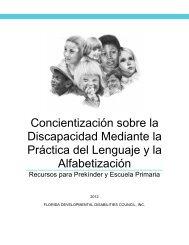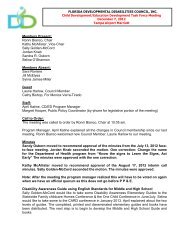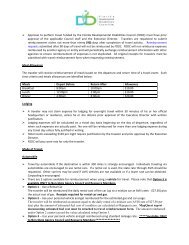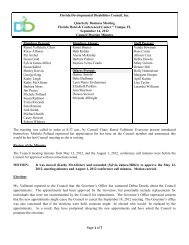Planning Ahead - Florida Developmental Disabilities Council
Planning Ahead - Florida Developmental Disabilities Council
Planning Ahead - Florida Developmental Disabilities Council
- No tags were found...
You also want an ePaper? Increase the reach of your titles
YUMPU automatically turns print PDFs into web optimized ePapers that Google loves.
Although it is not required by statute, it is advisable to always have a standby guardian advocateappointed at the time the guardian advocate is appointed. This person should be named in thepetition and would be identified in the order.After the guardian advocate order is issued, stating which rights are removed from the wardand given to the guardian advocate, all other actions and requirements are the same asthose stated in Chapter 744, F.S., Guardianship.Chapter 744, F.S., (Guardianship)Chapter 744, F.S., (Guardianship) covers all persons who might need guardianship for any reason(e.g. dementia, head trauma, mental illness, or any disability). It can be an expensive procedureand requires costly evaluations by professionals who may not be experienced or appropriate toevaluate persons with developmental disabilities.The types of guardianship found in Section 744.102(8)(b), F.S., are:• Full (Plenary) Guardianship (Section 744.102(8)(b), F.S. A person is appointed bythe court to exercise all delegable legal rights and powers of the person who has adisability. Full (plenary) guardianship is necessary for very few people. It removesall rights relating to both person and property. It requires that there first be anadjudication of the person as totally incapable of handling any personal decisions,money or property. After this adjudication of incapacity another hearing is held toappoint the guardian to make all decisions for the ward.• Limited Guardianship (Section 744.102(8)(a), F.S.). The court adjudicates the individualincapacitated in specific areas due to the fact that he lacks the capacity to dosome but not all of the tasks necessary to care for his person or property. After theadjudicatory hearing, another hearing is held and a guardian is then authorized tohandle only those rights and powers that the court finds the person incapable ofhandling.• Emergency Temporary Guardianship (Section 744.3031, F.S.). In emergency situationsa guardian may be appointed for the person and/or property of an allegedincapacitated person prior to the appointment of a full guardian. This is done aftera petition for incapacity has been filed when there appears to be imminent dangerto the person. (e.g. there is no one to make a critical medical decision that must bemade immediately.)• Voluntary Guardianship (Section 744.341, F.S.). If the court determines that theindividual is not incapacitated, but the individual files a voluntary petition forguardianship, the court may appoint a guardian or co-guardians of the property ofa person who, though otherwise mentally competent, is unable to manage property.A voluntary guardianship may be terminated by the ward.• Standby Guardianship (Section 744.304, F.S.). Guardians ordinarily wish to havea hand in deciding who shall take over when they die rather than have the courtchoose. Standbys may operate as guardian for 20 days after the death or incapacityof the guardian, at which time they must have the court confirm their appointment.The court may appoint a standby guardian with the same petitioning proceduresand at the same hearing as required for the basic guardianship. It is helpful to alsohave this information included in the guardian’s will.40Chapter 8, Legal Ways of Protecting Rights


